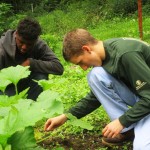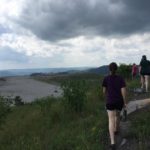Photos by Br. Peter Heiskell, Tom Wiley, Jillian Clemente, and Haley Curtin
By Tom Wiley, Staff Member
Simplicity has always been one of the four cornerstones of our life here at Nazareth Farm. Living simply at Nazareth Farm happens in many ways. It is rocking in porch chairs, talking with another volunteer, getting to know them. It is pouring a warm bucket shower over your head—with the sky overhead and creek below—to take off the dirt from a week at the worksites. It is making music together late into the night, with only your voices and a guitar as instruments. It is vigilantly turning off electric lights whenever you leave a room. It is conserving a toilet flush of water through the “if it’s yellow, let it mellow” system, or simply using an outhouse. It is reusing or recycling whenever we can. It is taking only the food that you can eat in solidarity with those who must live on less. It is caring for pets and garden plants. It is asking a question about fossil-fuel extraction and sustainable solutions. It is hiking through hills, admiring God’s grandeur in nature.
Since our beginning, Nazareth Farm has practiced this cornerstone as a way of living out the Gospel message of God’s creation. We view simple and sustainable living as our striving for right relationship with each other and our natural world. It is an essential message of the transformational service-retreats that we hold for our volunteers year round.
Last summer Pope Francis put out an urgent call addressed to “every person living on this planet” (3) in his encyclical letter Laudato Si’ reminding us of the responsibility which all of us have for our world, which we must love and protect. Recognizing the serious, man-made challenges our earth faces today—everything from climate change to ocean acidification to the extinction of countless species of life from existence—Laudato Si’ proposes “a bold cultural revolution” (114) to help humanity return to a more modest and sustainable lifestyle that will allow us to better care for our earth.
Part of this revolution, the Pope writes, must be a return to simplicity. Here is what he has to say:
We need to take up an ancient lesson, found in different religious traditions and also in the Bible. It is the conviction that “less is more.” A constant flood of new consumer goods can baffle the heart and prevent us from cherishing each thing and each moment. To be serenely present to each reality, however small it may be, opens us to much greater horizons of understanding and personal fulfillment. Christian spirituality proposes a growth marked by moderation and the capacity to be happy with little. It is a return to that simplicity which allows us to stop and appreciate the small things, to be grateful for the opportunities which life affords us, to be spiritually detached from what we possess, and not to succumb to sadness for what we lack. (222)
Pope Francis recognizes this return to simplicity as an “alternative understanding of the quality of life,” and he believes that all Christians are called to live out this alternative lifestyle.
On our retreats at Nazareth Farm our volunteers get an opportunity to return to this kind of simplicity. We tell them to ditch the electronics, gadgets, and smartphones that fill up our lives today with so much distraction. We urge them to be attentive to the little things, to see God in all things. In our rustic environment, we can be uniquely awake to nature around us—in the hills and hollows, in the running water of our creek, in the cats, dogs, and chickens who live here with us, and in the small breeze you feel at the summit of our hike on the ridge. On our retreats we also try to be uniquely present to each other in simple, welcoming community, with both our fellow volunteers who come together for a week of service and our neighbors here in Appalachia. During shared prayer, when volunteers share where they saw God during the week, they so often share finding the divine during the simplest of moments.
By opening their hearts to simple moments, our volunteers begin to reflect on how the compulsive consumerism and wastefulness that marks so much of modern life today affects them and their world. Pope Francis writes in Laudato Si’, “Many people know that our current progress and the mere amassing of things and pleasures are not enough to give meaning and joy to the human heart, yet they feel unable to give up what the market sets before them. (209)” On our retreats our volunteers experience giving up some things, such as their daily shower under running water, paper napkins at dinnertime, or the use of electricity when we have our “energy fast” on Wednesday night. These are little actions, just a drop in the ocean of what needs to be done to heal our world. Pope Francis tells us though:
There is a nobility in the duty to care for creation through little daily actions, and it is wonderful how education can bring about real changes in lifestyle… We must not think that these efforts are not going to change the world. They benefit society, often unbeknown to us, for they call forth a goodness which, albeit unseen, inevitably tends to spread. Furthermore, such actions can restore our sense of self-esteem; they can enable us to live more fully and to feel that life on earth is worthwhile. (211-212)
One of the most important gifts we give our volunteers is the knowledge to bring these little actions back to their schools, parishes, and communities. When we do a little action to protect our earth, such as setting up a compost bin for food waste or even just turning off an unnecessary light, we become mindful of our own duties to creation and model that commitment to others, too.
At Nazareth Farm we owe so much of our practice of sustainable simplicity to our neighbors in Appalachia who demonstrate this practice with their lives. Appalachia abounds with knowledge of how to live in respectful harmony with nature. People in Doddridge County often have a great commitment to this land. Many have made economic sacrifices to live in such a naturally beautiful location. Their lifestyle here is often marked by a thriftiness of resources guided by a practical, caring wisdom passed on through generations. I think of our neighbor who came by and walked through our tool racks, telling us how to get a longer life out of each tool, instead of throwing them out and buying new ones. I think of our neighbors who get part of their diet from the land around them: by maintaining beautiful vegetable gardens, by canning their extra harvest, by harvesting ramps and paw-paws from the hills (two Appalachian delicacies), and by using and storing all of the meat they hunt. Often this creative practice of ecological responsibility is carried out in Appalachia when people have limited material and fiscal means. In Laudato Si’, Pope Francis observes about such situations:
An admirable creativity and generosity is shown by persons and groups who respond to environmental limitations by alleviating the adverse effects of their surroundings and learning to orient their lives amid disorder and uncertainty… At times a commendable human ecology is practiced by the poor despite numerous hardships. (148)
Any of our volunteers who come to Appalachia with an open-minded attitude of encounter have much to learn from our neighbors here about the practice of human ecology.
We feel an urgent need to educate our volunteers about sustainability in large part because we know the stakes for Appalachia are so high. Fossil-fuel extraction plays a dramatic role in the story of this place. From coal mining to the natural gas drilling so prevalent today, fossil-fuel extraction in Appalachia has been a driver of economic production, but often it is had its cost on the land and people of this region. Appalachia’s coal and natural gas have powered the American economy for generations, and the people here are rightly proud of their role in our country’s prosperity. Too often, however, it seems that too little of the wealth generated from this area’s resources was invested back in this land and its people. Too often this mining left deep scars of environmental devastation that will take a long time to heal. Pope Francis evocatively writes in Laudato Si, “The earth, our home, is beginning to look more and more like an immense pile of filth. (21)” When you look at a denuded plain of rocky soil that was once a mountain, now stripped of its peak through mountaintop removal, when you see a 900-foot deep coal slurry impoundment filled with the chemical refuse of coal mining, when you see a hillside that you once treasured now torn apart and occupied by a hydro-fracturing pad several hundred feet across, it is easy to see what the Pope means here.
It is our great responsibility then to educate our volunteers who come here in as much of the story of fossil-fuel extraction and sustainable solutions as we can. We tell them about our neighbor who is grateful to have a job with a natural gas company, even though it requires him to work long hours and have less time with his family than he would like. We tell them about the mineral rights to this land that were usually sold by the people who live on the surface of the land long ago, and the disparity that creates. We tell them about the hydro-fracturing drilling of natural gas, often called fracking, which takes place at eight different large wells in Doddridge County. There is much debate about the safety of hydro-fracturing drilling. Many assure us that when properly regulated, it is a safe process. Others raise concerns about the potential impact of chemicals injected into the earth draining into the water aquifers people drink from, or the ground tremors that may result from disturbing the earth thousands of feet below its surface. Again, Pope Francis gives us some guidance about what a debate should look like:
Environmental impact assessment should not come after the drawing up of a business proposition or the proposal of a particular policy, plan or program. It should be part of the process from the beginning, and be carried out in a way which is interdisciplinary, transparent and free of all economic or political pressure. It should be linked to a study of working conditions and possible effects on people’s physical and mental health, on the local economy and on public safety…The local population should have a special place at the table; they are concerned about their own future and that of their children, and can consider goals transcending immediate economic interest. (183)
Our overwhelming concern is always for the people who live here among the resource extraction. One of our neighbors spoke clearly about this when he said about hydro-fracturing drilling: “I don’t mind a person making an honest living, but I want them to respect the people who have been living on this land a lot longer than they’ve been making money off of it.”
Finally, at Nazareth Farm we must consider how home repair itself factors into the care for creation. After all, we are, at our heart, a home-repair organization in Appalachia. We must remember that the human creature is part of God’s creation, too, and that the home people live in is a large part of their environment. Pope Francis thinks of this concern as well:
Authentic development includes efforts to bring about an integral improvement in the quality of human life, and this entails considering the setting in which people live their lives. These settings influence the way we think, feel and act. In our rooms, our homes, our workplaces and neighborhoods, we use our environment as a way of expressing our identity. We make every effort to adapt to our environment, but when it is disorderly, chaotic or saturated with noise and ugliness, such overstimulation makes it difficult to find ourselves integrated and happy. (147)
Caring for the human environment then means caring for its physical manifestation as rooms, homes, and shelter from the elements. When we replace someone’s roof that is leaking, when we build a new porch that they can enjoy a view of nature from, when we repaint a house to help maintain it and make it more aesthetically pleasing to the eye, we are improving and repairing their environment. Often in this home repair, we can make our homeowner’s houses more environmentally sustainable, too. We can better insulate windows and doors or install metal skirting on the bottom of trailer homes, so that they better keep heat in and use less energy. These changes help people save money on their heating bill, too. Such improvements increase the quality and happiness of human life in its environment.
Pope Francis gave his prophetic encyclical Laudato Si’ a meaning title. The document’s full title is Laudato Si’ (Praised Be You): On Care for Our Common Home. That subtitle On Care for Our Common Home is a powerful metaphor for a home-repair organization like Nazareth Farm. It is a reminder that caring for our common home can mean more than the repair of constructed houses. It is also caring for this natural world that we all live in, this creation that God has given to us as a gift. Pope Francis gives us this goal:
The urgent challenge to protect our common home includes a concern to bring the whole human family together to seek a sustainable and integral development, for we know that things can change. The Creator does not abandon us; he never forsakes his loving plan or repents of having created us. Humanity still has the ability to work together in building our common home. (13)
Nazareth Farm, energized by our faith and guided by our cornerstone of simplicity, will continue to carry our work of the home repair of this common home that we all share. We are grateful for the gift of Pope Francis’ words in Laudato Si, which will embolden us in this task. Pope Francis has reminded us of the need to work together—with our volunteers who come here from all over the country, with our neighbors here in Appalachia, with the church and all people of goodwill—to build up this home that we share together. We do this work hand in hand with the Loving God who created us and gave us the gift of our world together.



